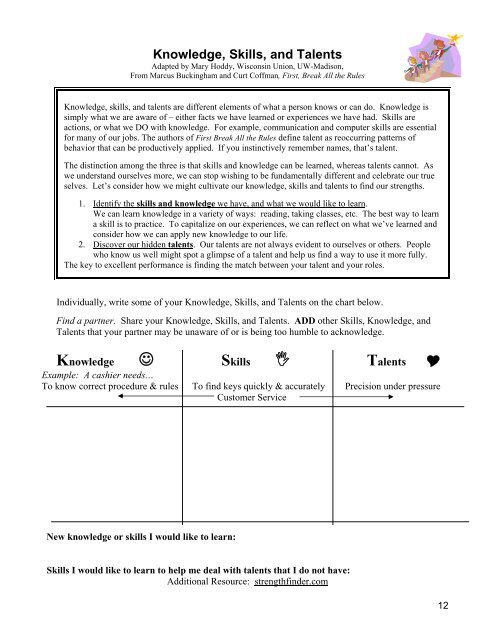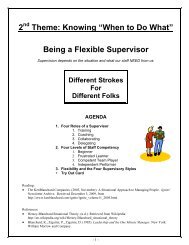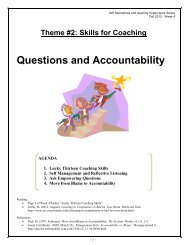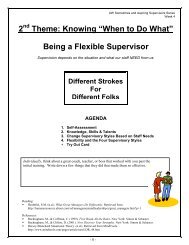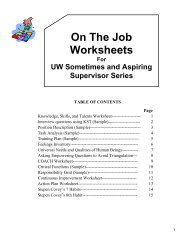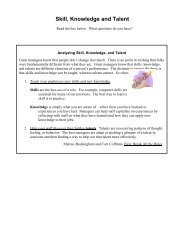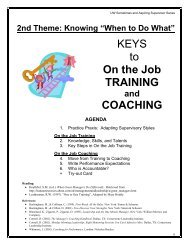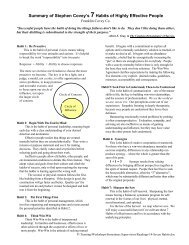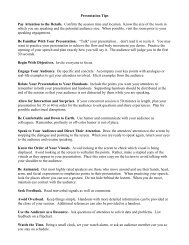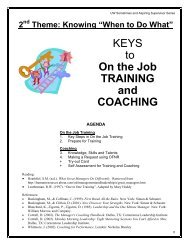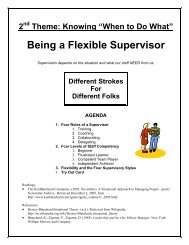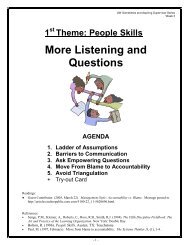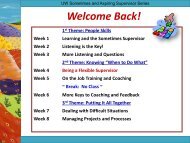Job Aids and Templates - Office of Human Resource Development
Job Aids and Templates - Office of Human Resource Development
Job Aids and Templates - Office of Human Resource Development
You also want an ePaper? Increase the reach of your titles
YUMPU automatically turns print PDFs into web optimized ePapers that Google loves.
Knowledge, Skills, <strong>and</strong> Talents<br />
Adapted by Mary Hoddy, Wisconsin Union, UW-Madison,<br />
From Marcus Buckingham <strong>and</strong> Curt C<strong>of</strong>fman, First, Break All the Rules<br />
Knowledge, skills, <strong>and</strong> talents are different elements <strong>of</strong> what a person knows or can do. Knowledge is<br />
simply what we are aware <strong>of</strong> – either facts we have learned or experiences we have had. Skills are<br />
actions, or what we DO with knowledge. For example, communication <strong>and</strong> computer skills are essential<br />
for many <strong>of</strong> our jobs. The authors <strong>of</strong> First Break All the Rules define talent as reoccurring patterns <strong>of</strong><br />
behavior that can be productively applied. If you instinctively remember names, that’s talent.<br />
The distinction among the three is that skills <strong>and</strong> knowledge can be learned, whereas talents cannot. As<br />
we underst<strong>and</strong> ourselves more, we can stop wishing to be fundamentally different <strong>and</strong> celebrate our true<br />
selves. Let’s consider how we might cultivate our knowledge, skills <strong>and</strong> talents to find our strengths.<br />
1. Identify the skills <strong>and</strong> knowledge we have, <strong>and</strong> what we would like to learn.<br />
We can learn knowledge in a variety <strong>of</strong> ways: reading, taking classes, etc. The best way to learn<br />
a skill is to practice. To capitalize on our experiences, we can reflect on what we’ve learned <strong>and</strong><br />
consider how we can apply new knowledge to our life.<br />
2. Discover our hidden talents. Our talents are not always evident to ourselves or others. People<br />
who know us well might spot a glimpse <strong>of</strong> a talent <strong>and</strong> help us find a way to use it more fully.<br />
The key to excellent performance is finding the match between your talent <strong>and</strong> your roles.<br />
Individually, write some <strong>of</strong> your Knowledge, Skills, <strong>and</strong> Talents on the chart below.<br />
Find a partner. Share your Knowledge, Skills, <strong>and</strong> Talents. ADD other Skills, Knowledge, <strong>and</strong><br />
Talents that your partner may be unaware <strong>of</strong> or is being too humble to acknowledge.<br />
Knowledge Skills Talents <br />
Example: A cashier needs…<br />
To know correct procedure & rules To find keys quickly & accurately Precision under pressure<br />
Customer Service<br />
New knowledge or skills I would like to learn:<br />
Skills I would like to learn to help me deal with talents that I do not have:<br />
Additional <strong>Resource</strong>: strengthfinder.com<br />
12


